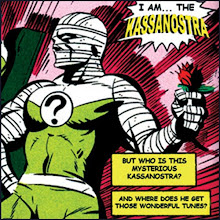 Or "Snoopy," as we're fond of calling it 'round Colebrook River Road. And only us, apparently. Marathon research jags into the annals of recorded ethnomusicological history have produced nary a reference connecting the ubiquitous beagle to Tommy James. (Other potential correlations also didn't pan out.) (Although if one of my readers can make a plausible link between Love and Draggin' the Line, I'll dance the damn thing in my skivvies at share this summer, that's how blown away I'll be.) Suffice to say, I got bubkis on the secret origins of this rechristening. What I can tell you about the tune itself is that it was released twice on the Roulette label (as a b-side in 1970, then as it's own single the following year), so there's a decent chance that the Hopewell Junction crowd has no idea what I'm talking about. (Any old-time kinderlachen care to weigh in?) It was James' first solo hit after breaking with longtime backing combo The Shondells, climbing to #4 on the Billboard Hot 100 chart in August of '71.
Or "Snoopy," as we're fond of calling it 'round Colebrook River Road. And only us, apparently. Marathon research jags into the annals of recorded ethnomusicological history have produced nary a reference connecting the ubiquitous beagle to Tommy James. (Other potential correlations also didn't pan out.) (Although if one of my readers can make a plausible link between Love and Draggin' the Line, I'll dance the damn thing in my skivvies at share this summer, that's how blown away I'll be.) Suffice to say, I got bubkis on the secret origins of this rechristening. What I can tell you about the tune itself is that it was released twice on the Roulette label (as a b-side in 1970, then as it's own single the following year), so there's a decent chance that the Hopewell Junction crowd has no idea what I'm talking about. (Any old-time kinderlachen care to weigh in?) It was James' first solo hit after breaking with longtime backing combo The Shondells, climbing to #4 on the Billboard Hot 100 chart in August of '71. And like most camp-related things going down in August, this one is a little peculiar. For example:
• First of all, any time a top-40 anything enters the Tolland canon, it's a little surprising.
 • It's a weird song for the camp scene, given that it may be an overt paean to illicit drug use, or it may be an "I ❤ Jesus" anthem. (It was released on James' second solo LP, a religious-themed album called Christian of the World.) Possibly it's both.
• It's a weird song for the camp scene, given that it may be an overt paean to illicit drug use, or it may be an "I ❤ Jesus" anthem. (It was released on James' second solo LP, a religious-themed album called Christian of the World.) Possibly it's both. • I totally get the significance of the Snoopy connection. Whatever the song's meaning, it's all about laid-back gratification with life's simple pleasures – a fitting epigram if ever there was one. But it leads to a glaring conundrum when you take into account the opening line of the second verse: "My dog Sam eats purple flowers." As Draggin' the Line, there's no problem. As Snoopy, it calls into question the heated deliberations over the anthropomorphization of fictional animals, with a case at least as contentious as the whole Goofy/Pluto debate.
 As a tune, it's almost impossible not to like. It's exactly the right blend of low-key psychedelia with a lazy-but-unswerving rhythmic beat. Dig that killer bass-riff opening, and the inspired trombone/trumpet call-and-response in the chorus. As a dance, it's also hard not to like: easy to learn, easy to remember, and maybe the only folkdance that improves the less energy you expend on it – perfect for those 90-degree afternoon dance sessions right before an hour of swim. And for the record, whoever came up with the opening count-off is a genius.
As a tune, it's almost impossible not to like. It's exactly the right blend of low-key psychedelia with a lazy-but-unswerving rhythmic beat. Dig that killer bass-riff opening, and the inspired trombone/trumpet call-and-response in the chorus. As a dance, it's also hard not to like: easy to learn, easy to remember, and maybe the only folkdance that improves the less energy you expend on it – perfect for those 90-degree afternoon dance sessions right before an hour of swim. And for the record, whoever came up with the opening count-off is a genius. 
Oh yeah. . . R.E.M. did a passable cover of Draggin' the Line for one of the Austin Powers soundtracks. Am I the only one who remembers that R.E.M. once promised if they were still together in the year 2000 they'd break up on principle? C'mon guys, show a little integrity. Bill Berry, thou art truly our hero. (This came out in 1999, so once again the KassaNostra narrowly avoids glaring hypocrisy! Michael Stipe can bite me.)
Just a quick heads-up before I go. It seems a little weird to keep posting about camp songs while camp's actually in session, so I'm planning to put the blog on hiatus for July and August. I'll post at least once, maybe more, before the end of this month. But those of you who rely on this site for your Kinderland music fix, you're gonna have to go without, or get yourself to Tolland this summer. Should my legions of fans choose to stage a Beatlemania-esque rally outside the camp office in an attempt to get me to change my mind, I may reconsider.
Peace & Vinyl,
The KassaNostra








